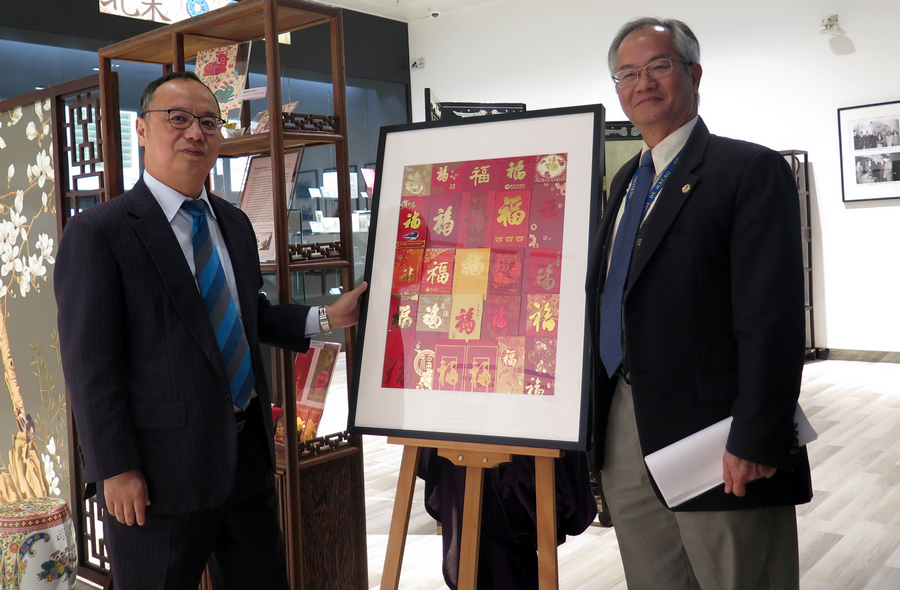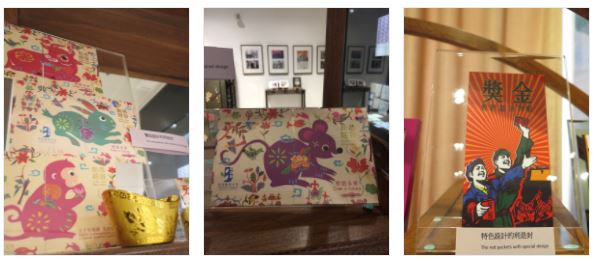The Chinese New Year (CNY) is the most important traditional holiday for Chinese people that has been celebrated for thousands of years. But do you know the taboos and customs associated with this holiday?
Writing Couplets for Friends and Relatives
Chen Shengbiao, a postgraduate student from the Department of Chinese Language and Literature, loves calligraphy and martial arts. He would thoroughly clean the house before the CNY and write couplets for friends, relatives, and neighbours. On the CNY eve, Chen and his family would stay up until midnight to hold worship ceremonies with incenses and offerings to the god of heaven and ancestors, which would be followed by lighting firecrackers. On the first day of the CNY, the entire family would finish all the sacrificial food. During the subsequent days, they would visit the relatives, friends, and neighbours. The celebration of the CNY is considered over until after the Lantern Festival.
‘There are a lot of CNY taboos in our family. For instance, we can’t sweep the floor on the first day of the CNY, and it’s best to wear red clothes during the holiday,’ says Chen. ‘Today’s young people may find some of the customs ridiculous. But they convey people’s wish for a good life. When you understand the meanings behind the taboos, you would be able to enjoy them more. It’s just like Christmas in the West. Everyone knows that Santa isn’t real, but people still hang socks at the head of the bed, waiting for gifts from Santa. Perhaps that is the fun and charm of holidays. ’
Flower Market and Red Packets
Ho Ka Hou, a second-year student from the Department of History, and his family, observe the same CNY taboos like most traditional Chinese families. These include no washing hair, no buying shoes, and no inauspicious sayings during the holiday. On the CNY eve, Ho and his family would have dinner together and visit the flower market afterwards. They would stay up until midnight for the god-worship ceremony. Of all the CNY customs, Ho’s favorite is receiving red packets. ‘When I was a child, I felt the happiest when I visited our relatives and friends with my parents during the CNY, because I could get a lot of red packets,’ he says. ‘Now I am an adult, but I still feel excited when I receive red packets.’
Shower with Dried Lime Leaves to Chase Away Bad Luck
Lobal Lu, a third-year economics major , comes from a Hakka family in Meizhou city , Guangdong province. On CNY eve, Lu’s mother would make sure that every member in the family takes a shower with dried lime leaves to chase away bad luck accumulated from the past year and to bring good luck in the coming year. Lu’s mother would cook traditional Hakka dishes on the CNY eve, among which braise tofu with wine sauce, pan-fried tofu skin, braised fish in brown sauce, and red yeast rice wine are a staple. ‘Before bed, mom would give me a red packet containing RMB 1000, but the next day , she would take it for safekeeping,’ says Lu. ‘This is a traditional practice in our family.’ Lu’s family would also climb a hill and visit a temple on the first day of the CNY to pray for safety and health for the entire family .
Customs Help to Strengthen Relationship Bond
As Tam Mei Leng, an associate professor from the Department of Chinese Language and Literature and a mother of two adult children, would probably tell you, mothers are the busiest people before the CNY. Tam would visit Lin Fong Temple and Kun Iam Tong before 16 December (lunar calendar), to thank the gods for blessing the family throughout the year. On 28 December (lunar calendar), she would thoroughly clean the house, change couplets, af fix new couplets and Tai Sui Fu on the doors. On 29 December (lunar calendar), she would buy flowers, dried mussels, and spring onions, and prepare the CNY candy box. On the CNY eve, she would prepare red packets, have dinner with her family, stay up until midnight, and then eat vegetarian dishes together. These CNY customs would keep her busy throughout the holiday . ‘In the past, I would visit the temple on the CNY eve to offer the first incense of the day , but now I don’t go as often,’ she says. ‘I observe these customs in order to examine how I did in the previous year so I can better plan for the next year. ’
The first thing Prof Tam does on the first day of the CNY is to call her superiors or elders to wish them a happy new year and arrange for a time to visit them. At noon, she would have dim sun with elders, with rice cake being a staple, because it conveys the good wish for professional advancement. She would also pick an auspicious time on that day to write wish papers to pray for blessings from Wenchang, a Taoist deity in Chinese mythology, known as the God of Culture and Literature. On the morning of the second day of the CNY, her family would have a vegetarian breakfast, and then go watch dragon dances to experience the festive atmosphere on the street. ‘Having dinner with family on the CNY eve, visiting the flower market, and visiting friends and relatives to wish them a happy new year are all group activities, with the aim of strengthening the bond between people,’ says Prof Tam. ‘Traditional Chinese culture values harmony. At first glance, these CNY activities seem to merely serve interpersonal, social, and economic purposes, but at a deeper level, they are about harmony, fulfilling one’s filial duty, remembering one’s root, and cherishing friendships.’
Meanings Behind the Taboos
An enthusiast about traditional Chinese culture, Prof Tam believes that there are meanings behind the CNY taboos. ‘For instance, it’s taboo to wash your hair on the first day of the CNY, but you are supposed to eat vegetarian dishes. This tradition has to do with health considerations and change of seasons,’ she says. ‘It is usually humid during the CNY, so washing your hair can induce internal dampness and increase your chances of getting sick, hence the taboo. It shares the same health rationale as avoiding washing hair after a woman just gives birth to a baby or receiving moxibustion therapy during the three hottest days in summer and three coldest days in winter . And as for not buying shoes or clocks, it is mainly because of the association with bad luck. ’
The sound of firecrackers signals the end of a year . Let us observe the CNY taboos to bring good luck and health in the coming year. My UM wishes all UM members a happy and prosperous new year!


